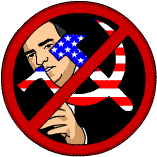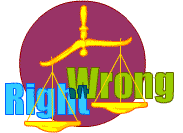Communists and Other Undesirables
Created | Updated Sep 26, 2010

"Communism is like Christianity. It turned out to be a very beautiful theory that has never been put into practice. Given human nature, I'm not sure it can be." – Ring Lardner, Jr ("Leftists in the Wilderness" U.S. News & World Report, 19 March 1990)
"Jesus was the first socialist, the first to seek a better life for mankind. " – Mikhail Gorbachev (Quoted in the Daily Telegraph, 16 June 1992)
I came across the first quote above while reading up on Ring Lardner, Jr, and it led me to remember the second. Remarkable how many honest people have been Communists, isn't it? (And how many of the same were not actually pure materialists.) I was reading up on Lardner because of his history with the House Un-American Activities Committee. The writer famously said, in public, "I could answer the way you want, Mr Chairman, but I'd hate myself in the morning." I like the cut of his jib.
Lardner was jailed and then blacklisted by the Commie hunters. I've chronicled what he did next elsewhere in this series, so I'll limit myself to remarking here that Lardner's effect on history was greater than two Oscars' worth. I wasn't that fond of the film M*A*S*H. I applaud the antiwar sentiment, though not what I perceive as its misogyny. But being willing to stand up for an idea is worth its weight in gold statuettes. 'Nuff said.
Gorbachev is another kettle of fish, since what he had to conceal from his fellow Politburo members was not his Communism, but his Christianity. Funny that nobody seems to see the similarity in the original ideas. I suspect those three Jews, Karl, Friedrich, and Yeshua, would have been able to have an interesting conversation about individual rights, the means of production, and the price of carob pods in the Galilee.
Introducing the question of ethnicity and religion into this discussion was part of my intent here. I've just been watching an old, classic film, Gentleman's Agreement, which deals with anti-Semitism in the US in 1947. Elektra, bless her heart, was astounded: People today might find it hard to believe that a "restricted" hotel was one which had an unspoken policy of suddenly being full up when Jews tried to register, rather than one which required a black credit card. That is enough to make anybody boiling mad – the ethnicity-and-religion bit, not the credit card business, which is just life. The film is truly amazing, and I recommend it. Well worth your two hours' attention. The accompanying material on the DVD was the eye-opener, though.
The production of a film like Gentleman's Agreement – one that openly taught tolerance – apparently alarmed certain people. And so it was that the House Un-American Activities Committee descended on Hollywood, a-hunting of the Communist foe. Asking questions such as: "Are you now, or have you ever been, a member of the Communist Party?"
Of course they were, or had been. The CP-USA was very active during the Great Depression. It actually offered help to the poor, unlike President Hoover, who was one of those who thought that helping the poor only encouraged them. Of course they joined the Party. They were young, they could think, and they wanted to do something. Duh. The HUAC appeared to find this suspicious, like "premature anti-fascism".
What we don't realise until we look harder at the people who were doing this, including two men who later became US presidents, is that they weren't as worried about Communists using Hollywood, that hotbed of sin, bad taste, and money-making, to propagandise Americans into – what, exactly? Helping their neighbours? Joining a union? Asking the Soviet Union to take over? (Why would they want to?) – as they were about other kinds of perceived ideological threats. Ones they couldn't talk about.
As Gentleman's Agreement shows, they couldn't come out in public and say they were anti-Semitic. Not actually say that, not right out loud, not in 1947. Not two years after the gates of Buchenwald had opened and revealed the grisly truth about what prejudice can do to people. The directors and actors of Hollywood knew what anti-Semitism did. Most of the big producers were Russian Jews. A notable exception was Mr Darryl F Zanuck, who made Gentleman's Agreement. He was always getting accused of being Jewish, but his folks were Dutch. His problem was that he grew up so poor he didn't have any formal education, kind of a dilemma for a writer.
Many of Hollywood's most famous actors knew what anti-Semitism did. They'd all changed their names to sound more – what? Aryan? Why would the name Jacob Julius Garfinkle sound less euphonious than John Garfield? Garfield is a boring name. Garfinkle has lustre (look it up).
Sure, the HUAC and others were hiding something. And it wasn't just the Jews they suspected of – what, exactly? Undermining their values? How? By suggesting they live up to their ethics? There were other groups – groups they couldn't even name in public – that they wanted to protect everyone from. Like, well, gays.
Lots of artistic people in Hollywood. Lots of artistic people in New York. Therefore, they feared, lots of unusual people in both places. Some of whom might not be...well...normal. They might be...hush. Whisper. How do we get rid of them, if we can't mention them to Mrs Golightly and the Sewing Circle? They might ask us to explain, and we'd just die. I know. Suggest that they are Communists.
Laura Z Hobson, the courageous woman who wrote the novel Gentleman's Agreement, Darryl F Zanuck, the courageous producer who made the film, and Elia Kazan, the less-than-courageous director who shot the film and then folded before the HUAC, all knew what these people were up to. So they used the film to teach tolerance. Not just stir people up about it. To teach how it worked.
The plot of the film is simple: A successful magazine writer from California is hired by a New York publisher to produce a series on anti-Semitism. Since nobody in New York knows the writer, he gets his material by pretending to be Jewish. Everybody is embarrassed by this exercise, including the writer's fiancée, a "liberal" who belongs to snobbish New England society. The writer refuses to marry her (even though she's Dorothy McGuire and a knock-out) until she figures out why she's letting the side down.
John Garfield helps. As the writer's best friend, he asks the woman, "When people tell anti-Semitic jokes, do you laugh?"
"Of course not," she replies indignantly. (Indignation sits so well on Dorothy McGuire, but we've got to be tough here, so we steel ourselves.)
Garfinkle, er, Garfield presses on:"But what do you do?"
"Why, er, I feel ashamed, of course, but..."
Aha.
It isn't enough to disapprove. If you let it go on, you're enabling. Wow. What a revelation in 1947. Weren't they thick back then?
Of course, we don't need anybody to tell us this now. We would never sit back while those next to us made remarks and bad jokes about Jews. Or about Muslims. Or about somebody else's religion. Or about somebody else's sexuality, or gender, or nationality...we never laugh at those kinds of jokes, not the ones about "I told her" or "Don't drop the soap", or "Aren't you glad that something bad happened to that guy because he's an American/atheist/Englishman, etc", we never pass them on, we never take cheap shots at easy targets...
It is such a relief to know this never happens any more. That heads of churches, for instance, can visit other countries without being attacked, verbally or otherwise, and that people who disagree with certain ideas are careful to stick to the subject, and never target other people's religions in the process. That nobody ever burns anybody else's flag, or holy book, or icon, no matter how mad they get. That nobody ever uses their opinions to bully other people by pretending that someone else's right to express themselves is a threat. That's a good thing, particularly when we remember all the abuse and violence of the past. It's good to know we've learned so much and come so far. It's good to know that we know not only that we should be tolerant, but how to go about doing it.
For instance, we know that deflecting an argument about our idea of truth into a personalised vendetta against another person or group is just plain wrong. We know that civil protest – the non-violent expression of a need for change – is a tool to be used responsibly and only when it is needed. We would never use this tool to rally 5,000 of our closest twitter buddies into a rent-a-crowd just in order to terrorise a religious or ethnic group we happen to dislike for personal reasons. It is such a relief to be free of all that bullying disguised as citizenship.
Which is why I hesitated to bring up the whole question of anti-Communism, anti-Semitism, and homophobia. After all, we don't have these problems nowadays, do we? So please regard this as a quaint historical note, and go on with your interesting online reading. Thanks for your patience and tolerance.

Fact and Fiction by Dmitri Gheorgheni Archive
